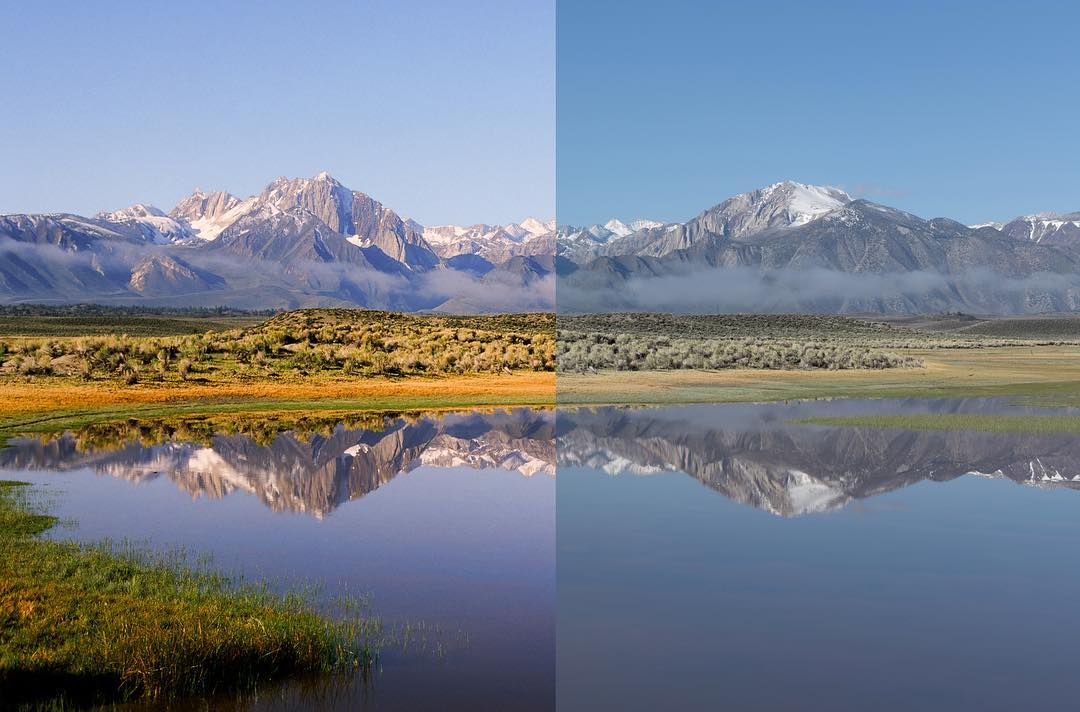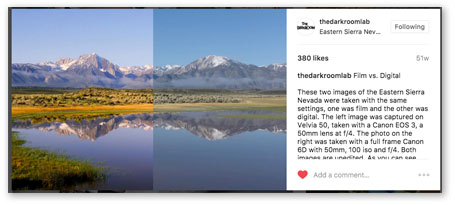Can Digital Cameras Shoot Like Film Cameras?
With film usage and adoption on the rise, nosotros wanted to resurrect the fence of digital photos versus analog photos. Equally a picture processing lab, nosotros obviously accept a bias, and then not going to say which is amend, simply to nowadays the differences and list advantages.
While in Eastern Sierra Nevada, we shot two photos, 1 film and the other digital. Both the digital photo and the film photograph were taken with the aforementioned settings. The left prototype was captured on Velvia 50, taken with a Canon EOS 3, a 50mm lens at f/4. The photo on the correct was taken with a full-frame Canon 6D with 50mm, 100 iso, and f/4. Both images are unedited. Every bit y'all can run across, Velvia 50 has a very fine grain and has rich, vibrant colors directly from the scan compared to the unedited JPEG from the Canon 6D. And yes, you practise have the selection to edit digital photos, only at that place'southward something special about making a beautiful image in-camera on film and not having to spend any time editing!
Also, if you're looking for a picayune less saturation, in that location are other great moving-picture show choices, like Provia 100, which isn't as saturated merely still has dandy colour and fine grain, or you could go with a color negative moving-picture show which volition give you more than subtle colors and has a wider range of exposure latitude.

Film Photography Advantages
- Lower initial cost than for a comparable digital camera
- With a college dynamic range, motion-picture show is better at capturing white's and blacks' details and tin can't be replicated with digital cameras. Likewise, film can capture subtle details lost in digital photography.
- Pic is more forgiving of pocket-size focusing bug and exposure issues.
- Film captures photos at college resolution than most digital cameras.
- Analog picture show can exist pushed or pulled multiple stops when needed, but the corporeality of contrast within the image is afflicted. Some photographers use this to their advantage to create the platonic expect they want, but this method nevertheless does not allow extremely loftier ISO speeds without impacting image tones.
- Film photographers with a express number of exposures available on a roll of picture must think more about their images earlier shooting them. Digital photographers tend to take pictures first and think later. Depending on your viewpoint, this is either an advantage or disadvantage.
- Unlike digital cameras, film cameras are future proof and don't go obsolete.
- No power or batteries needed. Long trips and common cold conditions can be limiting for digital cameras.
- The Darkroom photo lab scans your film photos, at present allowing you lot to edit your images on a estimator with photograph-editing software or share on social media.
Digital Photography Advantages
- The resolution in even point-and-shoot cameras, which is often 12 to 20 megapixels, is high plenty resolution for big prints.
- Digital cameras besides have the advantage of existence able to change motion picture speeds betwixt private photographs.
- The cameras are generally lighter weight than picture show cameras.
- Memory cards are tiny and can store many images.
- Instant gratification and images can be viewed immediately. Some film photographers consider this a disadvantage.
- You can edit your images directly on the camera.
- Yous can choose to print but the images you similar best.
- Many cameras offering built-in filters.
Movie Offers Color Consistency and Dynamic Range over Digital
Picture is the golden standard of photography. Nothing compares – not fifty-fifty digital. A good instance of this is when a pic company like Fujifilm tries to match film's cute color consistency. Such an 'advancement' in technology is nothing more than than a marketing gimmick.
Film is the golden standard of photography.
Accept Provia and Velvia, for instance; when Fujifilm tried to replicate these stunning film stocks into their mirrorless digital cameras, it was a lamentable 24-hour interval indeed. Rather than making more picture show, they halted product and turned their attention to replicating the color science in photographic camera. Digital mirrorless owners rejoiced every bit they could now take photos enriched with 'Veliva' and 'Provia' simulations. Looking at these cameras' digital photos, the flick simulation effect is merely a punch in contrast and saturation with some embedded metadata text. This type of marketing ploy has zilch on the traditional picture show stock we have been shooting for years. That'due south why when yous pick up a roll of Velvia or Provia, you know that nothing is going to shell the original. The color consistency is famous in film and not every bit a digital reproduction.
Cheque out The Darkrooms pic index, reviews, and samples
Adding to this, the movie can capture a wider dynamic range (xiii stops, to exist exact) than most digital cameras. Because of this, you lot won't have to edit your highlights, lift your shadows, or increase saturation. The epitome is perfect in every manner. You can't get the same results on a digital photographic camera.
Resolution of Picture is College Than Well-nigh Digital Cameras
The title to a higher place may seem far-fetched for those new to motion-picture show, but allow united states explain it to you. Film is manufactured in various formats to accommodate a diverseness of cameras. This is much the same as the sensor sizes on digital cameras. However, different digital cameras, motion-picture show tin can capture and shop at greater resolutions. More than specifically, when the picture show stock is larger, so is the photon count on the film stock's surface.
For example, if nosotros were to put a 120mm negative confronting a 35mm full-frame digital sensor, the film's resolution would trump the digital camera. This will be more than evident at lower ISOs; nonetheless, as you increase ISO, the point-to-racket ratio drastically changes, and the digital sensor will win in terms of resolution.
So if you are looking to shoot film at lower ISO'south (Under 800, let'due south say), and then the resolution yous can go volition outperform a smaller sensor.
Amazing Photos with Cheap Cameras
Top 10 Photography Podcasts for Picture show Photographers
Picture show Processing And Editing Is Every bit Creative As Taking The Shot
Ane of the fundamental elements of film photography is the artistic command offered throughout the processing and editing stages. Rather than being a bulk-edit workflow as experienced in digital, at that place is a staged process involved with flick. It is a process that is both enjoyable and challenging but nonetheless i that you accept full control over. 1 of the biggest advantages of moving-picture show editing is the greater level of light direction within the darkroom environs. Motion-picture show offers a significant level of dynamic range with less blowout of highlights and loss of detail in shadow areas. Digital files can exist impossible to recover from such issues.
While it is convenient that digital editing can be done in-camera or on a digital device, it is ofttimes done on the go. There is fulfillment and enjoyment in our decorated world to exist gained in slowing down and working within a darkroom a lab. Alternatively, many are now taking the time to work on loftier-resolution scans from moving-picture show photography outings. With the right processing flow, flick negatives will last a lifetime and tin be used for scans or prints numerous times. Those in the digital world alive in constant fright of computer crashes, difficult drive failures, or even memory bill of fare corruption. There is cypher worse than a memory card read error while in the field or while trying to import images onto a computer.
Editing should be far more simply pushing around sliders on a screen. Film processing and editing impacts all the senses and brings you closer to creative outcomes.
The Cost Of Motion-picture show Photography Is More Manageable and Less Jarring Than Digital
Like it or not, the costs involved in photography'south creative pursuit are a key consideration for many people. Both film and digital have unique cost considerations worth exploring – however, film photography has a gentler approach with a lower financial burden. With film, your up-front costs are far less as film cameras' price is significantly lower than that of a mod DSLR or mirrorless kit. The price of some of the high-cease models is staggering and would place most under financial strain. Plus, you are shackled with the other drawbacks of being locked into the digital medium.
Film photography spreads its costs out throughout your life as a photographer. Bated from the photographic camera, the ongoing toll of film is a low-cost element – buying in majority is always a smart option as you are more likely to go out and shoot with a purse total of film. Plus, you save a little on each scroll with a bulk lot. From at that place, you are looking at lab and darkroom costs depending on how deep you want to dive. A popular solution is to manage lab costs by opting for digital scans of your motion-picture show. These scans are of the highest quality and retain all the quality and detail of your original shots. Plus, you at present accept full creative control of which management you lot want to head and how much you want to spend.
You can now take your digital scans and edit them further with your preferred editing software – or non at all. You can opt to print your scans at dwelling or through a lab in whatever size and format you want. And, if yous are so inclined, you can, of course, share your work on your site, blog, or via social media platforms. Either way, it is evident that you will invest much less with moving-picture show throughout your photography life than you would through digital. Movie cameras last lifetimes while digital-but final as long every bit their circuits hold-up.
We'd beloved to hear your thoughts on this topic in the comments below.
 This was originally posted on our Instagram (instagram.com/thedarkroomlab).
This was originally posted on our Instagram (instagram.com/thedarkroomlab).
Source: https://thedarkroom.com/film-vs-digital-comparison/
Posted by: madisonbablin1977.blogspot.com


0 Response to "Can Digital Cameras Shoot Like Film Cameras?"
Post a Comment